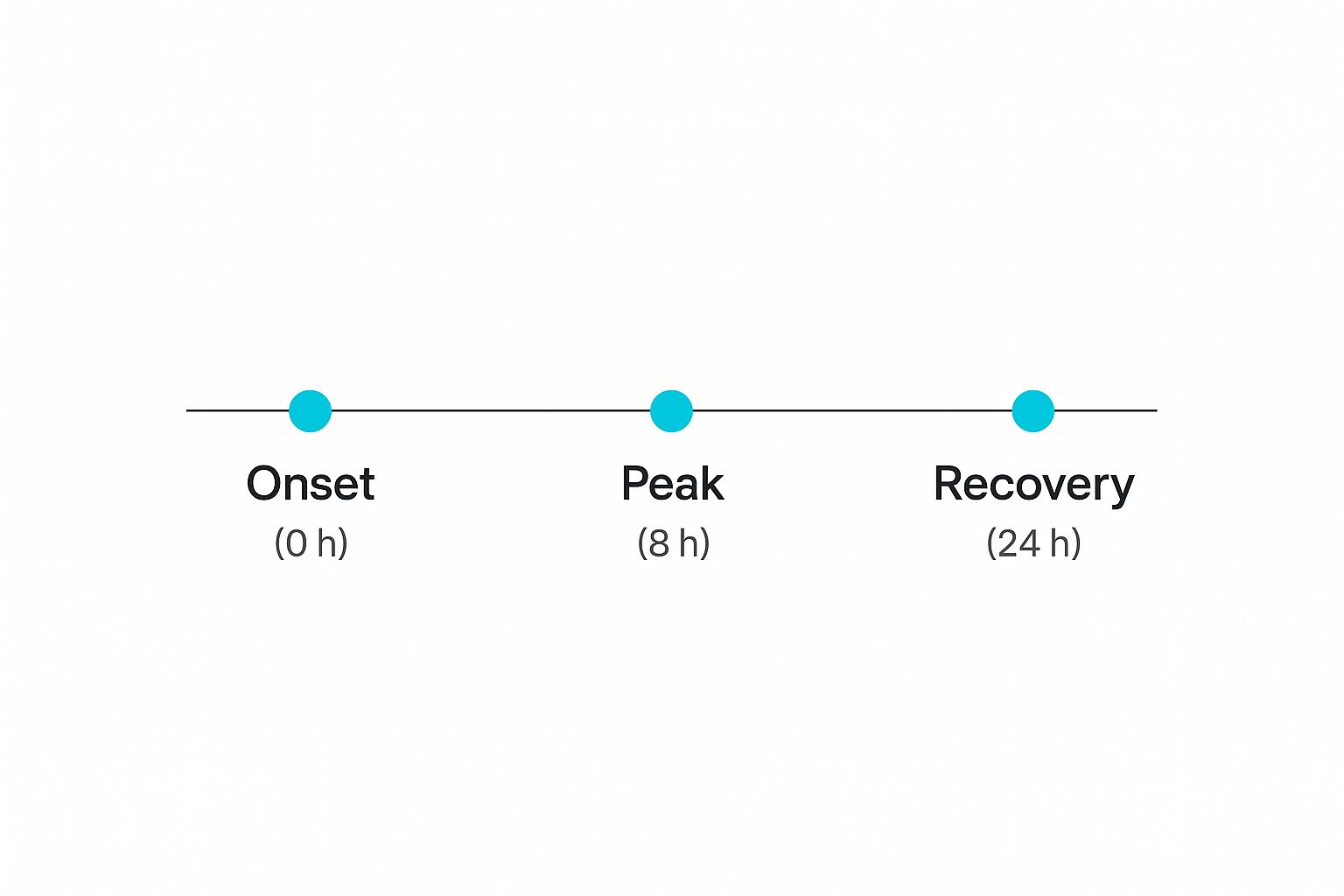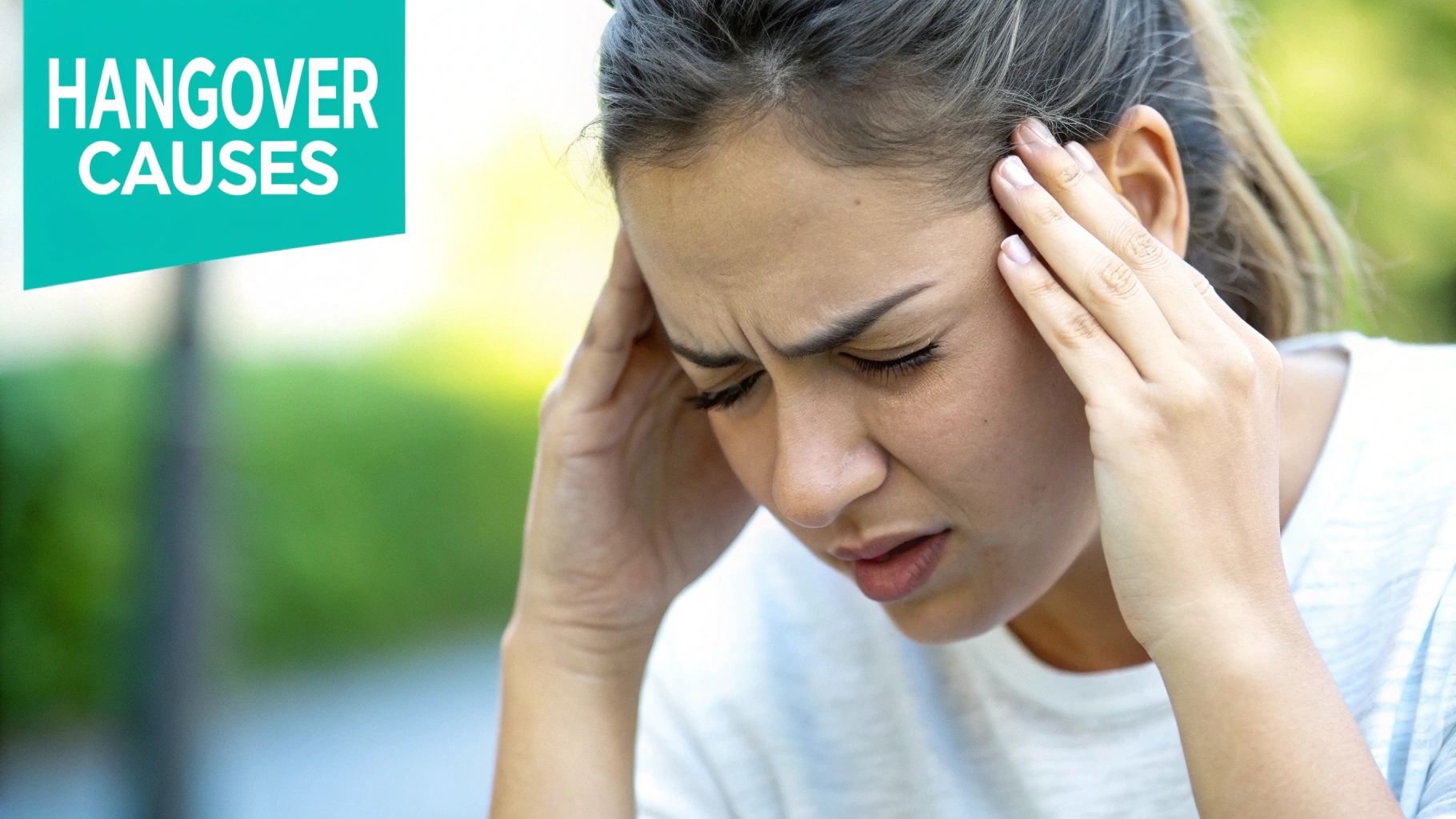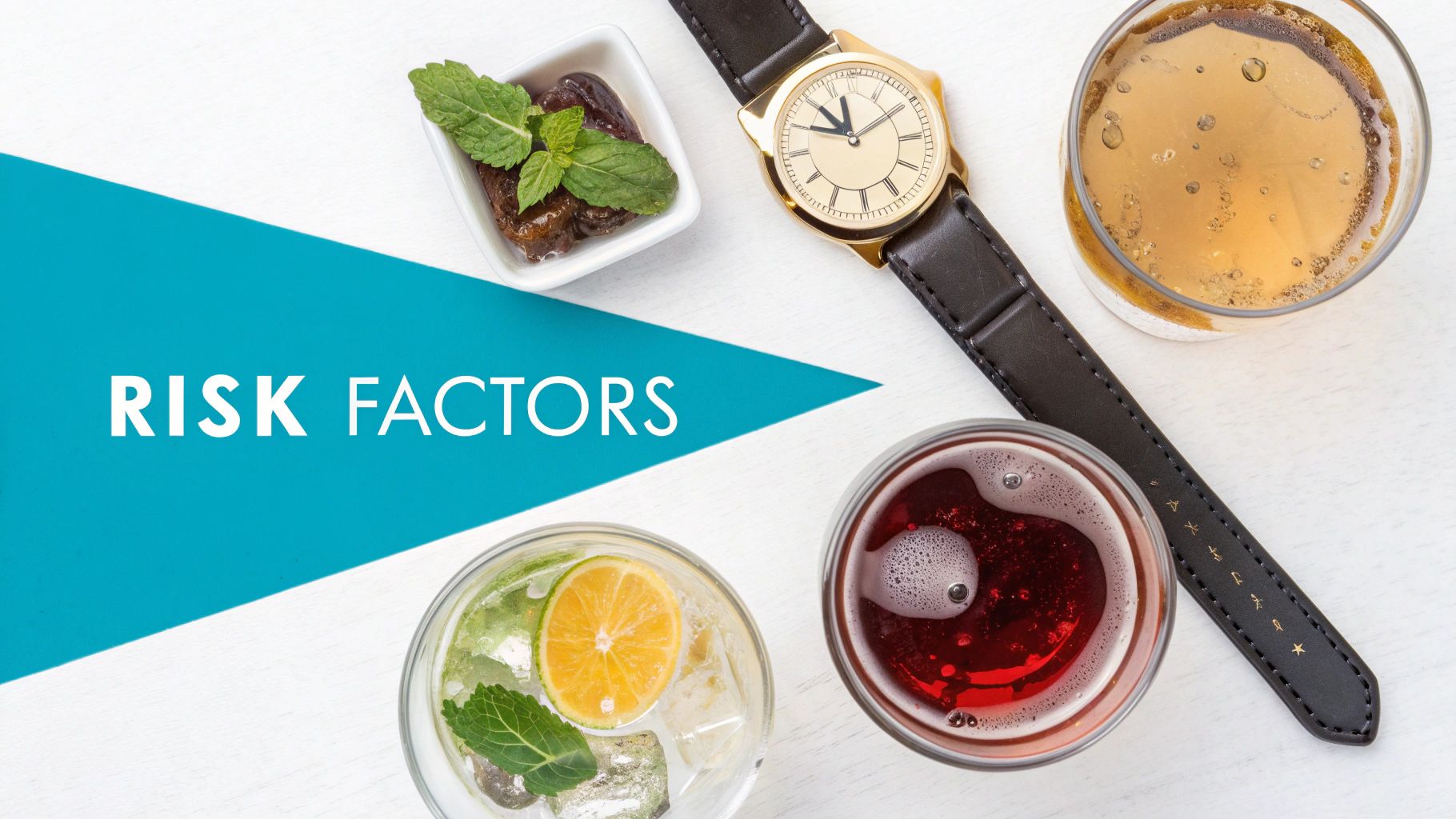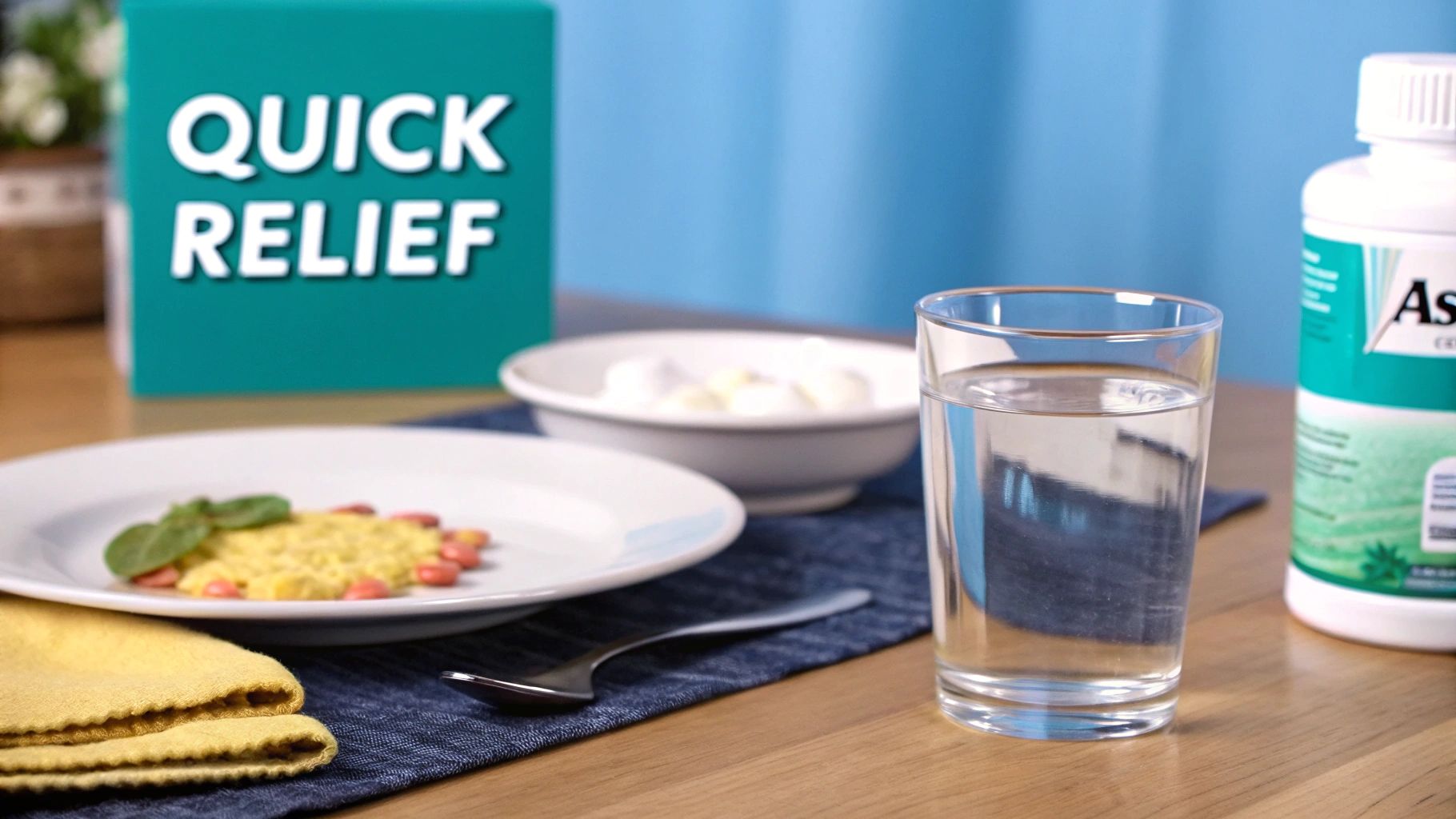

· By Annemarie
How Long Does Hangover Last? Find Out the Complete Timeline
So, how long does a hangover really last? If you’re looking for a straight answer, here it is: most hangovers are gone within 24 hours. But let's be honest, that 24-hour window can feel like an eternity, and the experience is different for everyone. Some symptoms vanish after a few hours, while others seem to cling on for dear life.
The Typical Hangover Timeline Explained
Think of a hangover like a passing storm. It slowly rolls in, hits with full force, and then, thankfully, clears out. Understanding this cycle can help you know what to expect and when you might finally feel human again. The whole process kicks off as your blood alcohol concentration (BAC) starts its slow decline back to zero.
The first hints of trouble usually show up a few hours after your last drink, but the real misery often waits until the next morning to make its grand entrance. This is when your body is grappling with the full-on assault of dehydration, inflammation, and a seriously disrupted sleep cycle. While the severity can be a bit of a lottery, the timeline itself is usually pretty predictable.
To make things a bit clearer, we can break down the typical progression of a hangover into distinct stages. Knowing what's happening and when can make the whole ordeal feel a little less chaotic.
Below is a table that outlines the common stages and symptoms you can expect as a hangover runs its course.
Hangover Stages and Symptom Timeline
| Hangover Stage | Typical Timing (After Drinking Stops) | Common Symptoms |
|---|---|---|
| The Onset | 2-6 hours | Subtle headache, growing thirst, mild fatigue, maybe a little grumpiness. |
| The Peak | 8-12 hours | Pounding headache, nausea, extreme sensitivity to light and sound, dizziness. |
| The Recovery | 12-24 hours | Symptoms gradually fade as you rehydrate, rest, and eat. Aches and brain fog may linger. |
As you can see, the worst of it hits when you’re well into the recovery phase, which brings us to a key point.
Here's the kicker: your hangover is at its absolute worst when there’s no alcohol left in your system. That feeling of pure misery? That’s just your body working overtime to clean up the mess from the night before.
This image gives you a simple visual of how a hangover progresses from that first twinge to full recovery.

As the timeline shows, that peak discomfort—the real "I'm never drinking again" moment—usually hits around the 8-hour mark, long after you've called it a night.
While the 24-hour rule of thumb is solid, everyone’s body is different. Some research points to the average hangover lasting about 18.4 hours from the time you stop drinking. Factors like a terrible night's sleep can definitely drag things out, making the dehydration and other stressors feel much, much worse.
What Makes Some Hangovers Worse Than Others?

Ever wake up after a night out feeling surprisingly fine, only to have a similar night out later leave you questioning every life choice you’ve ever made? It’s a common experience. The intensity of a hangover—and how long it sticks around—isn't always straightforward. A few key factors are responsible for turning a mild inconvenience into a full-blown crisis.
One of the biggest culprits behind a truly brutal hangover is a group of chemical compounds called congeners. These are natural byproducts from the fermentation and aging process, and they’re what give many alcoholic drinks their unique flavors and colors.
Think of it like this: your body is an engine. Clear liquors like gin and vodka are like clean-burning, premium fuel—they have very few congeners. On the other hand, darker liquors like whiskey, bourbon, and even red wine are like a lower-grade, dirtier fuel. They’re loaded with congeners that make your body work overtime to process everything, leading to more inflammation and a much meaner hangover.
The Role of Dehydration and Sleep Disruption
Beyond what you’re drinking, two other major players decide how miserable your morning will be: dehydration and bad sleep. Alcohol is a diuretic, which is just a fancy way of saying it makes you pee a lot. All that fluid loss leads to the classic hangover symptoms we all know and hate—thirst, dizziness, and a pounding headache.
Even a tiny bit of dehydration can make a huge difference in how you feel. It forces your heart to work harder and can even reduce blood flow to your brain, which is a perfect recipe for brain fog and fatigue.
And while a few drinks might make you feel sleepy and knock you out fast, they absolutely wreck the quality of that sleep. Alcohol suppresses your REM sleep, which is the most restorative stage where your brain recharges and processes memories. This is exactly why you can get a full eight hours of sleep and still wake up feeling completely drained. To really get into the nitty-gritty of it all, you can explore our detailed guide on what causes hangovers.
Your Body’s Inflammatory Response
Another critical piece of the puzzle is your own immune system. When you drink, your body sees alcohol as a toxin and kicks off an inflammatory response to fight it off. This immune reaction is what’s behind that general feeling of being unwell, almost like you’re coming down with a cold.
Your body basically goes into defense mode, releasing inflammatory markers that contribute to feelings of fatigue, memory problems, and a lack of appetite. It’s not just in your head; your system is actively working against the inflammation alcohol has caused.
This inflammatory storm, combined with dehydration and poor sleep, creates the perfect conditions for a killer hangover. It's a widespread problem, too. Cultural drinking habits can even play a role in how often people feel hungover. In the UK, for instance, about two in ten people say they get hangovers regularly, with some lasting up to 36 hours. That's a bit higher than places like Australia and Germany, where about 16% of people report the same.
Understanding these factors is the first step toward making choices that lead to much, much better mornings.
Here is the rewritten section, crafted to sound completely human-written and natural, following all your requirements.
How Age and Lifestyle Affect Hangover Duration
If you've ever woken up thinking, "My hangovers have definitely gotten worse over the years," you're not wrong. It’s not just in your head. How long a hangover sticks around isn't just about how much you drank—your age and daily habits play a massive part in how quickly your body can bounce back. These factors set the stage for your recovery long before you even take that first sip.
As we get older, our bodies just don't process alcohol the way they used to. Your liver, the main player in breaking down alcohol, gets a little less efficient over time. Think of it like a veteran athlete; they’ve still got the skills, but they can't recover from a tough game quite as fast as they did in their prime.
On top of that, your metabolism naturally slows down, and your body holds less water. This one-two punch means alcohol lingers in your system longer and at a higher concentration, making its effects feel more intense and dragging out the whole miserable experience.
Your Daily Habits Matter More Than You Think
The choices you make every day create a baseline for how well your body handles a night out. Things like your diet, exercise routine, and how you manage stress have a direct impact on how long that post-party fog lasts.
- Diet and Nutrition: A well-fed body is a strong body. If you're eating nutrient-rich foods and staying hydrated before you even start drinking, your system is just better prepared to deal with the stress alcohol throws at it.
- Exercise Routine: Getting your body moving regularly isn't just good for your heart; it boosts your metabolism and helps your body process toxins more efficiently. It’s like having a more effective cleanup crew on standby.
- Stress Levels: If you're constantly stressed, your body is already in a state of inflammation. Adding alcohol to that equation is like pouring gasoline on a fire. It makes the inflammatory response—and the hangover that follows—so much worse.
The takeaway here is simple: your body’s overall health determines its ability to recover. A system that's already running on empty is going to have a much rougher time bouncing back from a few drinks compared to one that's well-maintained and resilient.
It's interesting, too, how these lifestyle differences might explain why hangovers seem to hit different generations so differently. A recent survey showed that Millennials report hangovers lasting an average of 7.27 hours. That's quite a bit longer than both Gen Z (5.4 hours) and baby boomers (6.1 hours). It could be that things like higher stress levels and different drinking habits are making that morning-after recovery tougher for them.
Of course, what you're drinking matters, too—tequila, for example, is famous for causing some seriously nasty hangovers. You can dive deeper into these generational differences and see how your own experience stacks up.
Evidence-Based Remedies To Recover Faster

Understanding what makes a hangover so miserable is one thing, but knowing how to actually fight back is a whole different ball game. When you're in the throes of a rough morning, you need real, science-backed solutions—not old wives' tales that just drag out the agony. The goal here is simple: shorten the hangover and make the whole recovery process a lot less painful.
First, let's just get this out of the way: the "hair of the dog" is a terrible idea. Sure, drinking more alcohol the next day might give you a fleeting moment of relief, but it's a trap. It just delays the inevitable crash and puts even more strain on your already overworked liver. A real recovery plan is all about supporting your body, not chucking more toxins into the mix.
Strategic Rehydration And Nutrition
Your first order of business should be tackling dehydration and low blood sugar. These two are the main culprits behind that awful, run-over-by-a-truck feeling. Alcohol is a diuretic, which is a fancy way of saying it makes you pee a lot, flushing out water and essential electrolytes. Just chugging plain water isn't always enough to fix the problem quickly.
- Hydrate with Electrolytes: You need to bring in the good stuff. Go for drinks that contain electrolytes like sodium, potassium, and magnesium. Think coconut water, a sports drink, or even just a glass of water with a pinch of salt and a squeeze of lemon. This will rehydrate you way more effectively than water alone.
- Eat Smart Carbs: Alcohol can make your blood sugar tank, which is why you feel so weak and tired. Eating easily digestible carbs helps bring those glucose levels back to normal. We're talking toast with avocado, a banana, or a simple bowl of oatmeal. These give you a steady stream of energy without making your sensitive stomach angry.
Getting these two things right gives your body the basic building blocks it needs to start healing. It's the first, most critical step to cutting your hangover short.
The most effective hangover remedies work by addressing the root physiological issues—dehydration, inflammation, and nutrient depletion. It's about giving your body the tools it needs to clean up the mess left behind by alcohol.
Supporting Your Body's Natural Recovery
Beyond the basics of food and water, certain compounds can actively help your body's recovery systems. This is where modern science really gives us an edge in feeling better, faster. One of the most exciting ingredients on this front is Dihydromyricetin (DHM), a natural plant extract that’s a total game-changer.
DHM works by helping your liver break down acetaldehyde—that nasty, toxic byproduct of alcohol that's largely responsible for your hangover symptoms. By helping your liver process this toxin more efficiently, DHM can shorten both the length and severity of your hangover. It’s like giving your liver a super-powered assistant to speed up its cleanup duties.
A few other supportive ingredients can also make a real difference:
- B Vitamins: Alcohol burns through your body's B vitamins, which are absolutely essential for energy and brain function. Topping them up can help you fight off that crushing fatigue and brain fog.
- Zinc: This mineral actually plays a role in how your body metabolizes alcohol, and some studies suggest it can help dial down the severity of your hangover.
If you want to dive deeper into a full recovery plan, our guide on how to cure a hangover fast with science-backed tips has even more great advice.
Finally, never, ever underestimate the power of rest. Your body is working overtime to get back to normal. It can be tempting to just power through with a ton of caffeine, but that can actually make your dehydration worse. If you can, give yourself a break. Let your body do its thing. By combining smart remedies with proper rest, you can seriously cut down your recovery time and get back to feeling like yourself again.
Proactive Strategies to Prevent a Severe Hangover

We all know that feeling of dread the morning after a great night out. While knowing how to handle a hangover is definitely a useful skill, the absolute best move is to avoid getting one in the first place. A few smart choices before you even take your first sip can make a world of difference. It’s not about holding back on the fun—it’s about preparing your body so you can enjoy the night without paying for it later.
Think of it like getting ready for a big game. An athlete wouldn’t show up without stretching and fueling up, right? You should treat a night out the same way. The single most important thing you can do is to never drink on an empty stomach. Having a solid, balanced meal with protein, healthy fats, and complex carbs beforehand slows down how quickly alcohol hits your system. This gives your body a fighting chance to process everything without getting overwhelmed.
Your Game Plan For a Better Morning
Once you’ve got a good meal in you, the next step is to be mindful of how you drink. It’s not just what’s in your glass, but how fast it’s going down. Pacing yourself is everything. When your blood alcohol level spikes too quickly, it’s a one-way ticket to a long, painful hangover.
Here are a few simple tricks I swear by:
- Stick to the "One-for-One" Rule: For every cocktail, beer, or glass of wine, follow it up with a full glass of water. It’s a game-changer for staying hydrated and it naturally slows you down.
- Choose Your Drinks Wisely: As we talked about earlier, darker drinks like bourbon and red wine are loaded with congeners, which can make for a rough morning. Sticking to clearer spirits like vodka or gin often leads to a much kinder hangover.
- Pace Yourself: Your liver can really only handle about one standard drink per hour. If you can keep your pace close to that, you’ll avoid putting your system into overdrive.
The real secret is staying ahead of the game. When you actively manage your hydration and drinking pace, you stay in control and slash your odds of waking up with that all-too-familiar, regret-filled headache.
If you’re looking for a full rundown of smart drinking habits, our guide on how to prevent a hangover before drinking has all the expert tips you need. A little planning goes a long way and can be the difference between a fantastic night and a day spent wishing you could turn back time. By mixing these strategies, you can dodge a nasty hangover and shorten any effects that do creep in.
Your Questions About Hangovers Answered
To wrap things up, let's dive into some of the most common questions we get about hangovers. We'll clear up the confusion with some straight-up, science-backed answers to help you understand what’s really going on with your body after a night out.
Can A Hangover Really Last For Two Days?
Absolutely. A hangover can definitely drag on for a full 48 hours, giving you the dreaded "two-day hangover." This usually happens after a night of particularly heavy drinking.
It all comes down to your body being completely overwhelmed. You’re dealing with severe dehydration, a totally disrupted sleep cycle, and a high dose of congeners—those pesky compounds found in darker liquors. Your body is working overtime to flush out toxins, rebalance itself, and fight inflammation, and that just takes time. Age can also be a factor; as we get older, our liver processes alcohol a bit slower, naturally stretching out that recovery period. If you’re regularly battling hangovers that last more than 24 hours, it might be a sign to rethink your drinking habits.
Does The 'Hair Of The Dog' Remedy Actually Work?
While reaching for another drink the next morning might make you feel better for a hot minute, it's a total trap, not a real solution. The "hair of the dog" trick just puts off the inevitable. Your body still has to metabolize all the alcohol from the night before, and piling more on top only delays the recovery process and adds more stress to your liver.
The brief relief you feel is from a temporary endorphin boost from the alcohol, but the crash that follows can leave you feeling even worse. A much smarter move is to focus on what your body actually needs: rehydration, good nutrition, and real rest.
Why Do I Get A Hangover After Just One or Two Drinks?
It's incredibly frustrating to feel hungover after just a couple of drinks, but it's more common than you think. There are a few reasons this might be happening. You could simply have a lower natural tolerance for alcohol or a specific sensitivity to things like sulfites or histamines, which are common in wine and beer.
Dehydration is another major culprit. If you were already a bit dehydrated before your first sip, alcohol is just going to make it worse. Other things can amplify alcohol's effects, too—like drinking on an empty stomach (which makes alcohol absorb faster) or being tired or stressed to begin with. For some, it can even be a genetic thing, making it harder for their body to break down acetaldehyde, the main toxin from alcohol. It’s a good reminder that everyone’s body is unique.
Ready to say goodbye to rough mornings and hello to brighter days? With Upside, you can enjoy your night without sacrificing your next day. Our science-backed jelly sticks are packed with natural ingredients to help your body bounce back, so you can live life to the fullest. Try it for yourself and feel the difference. Learn more and get your Upside Hangover Sticks today!
